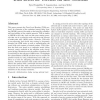Free Online Productivity Tools
i2Speak
i2Symbol
i2OCR
iTex2Img
iWeb2Print
iWeb2Shot
i2Type
iPdf2Split
iPdf2Merge
i2Bopomofo
i2Arabic
i2Style
i2Image
i2PDF
iLatex2Rtf
Sci2ools
117
click to vote
IJNSEC
2008
2008
Optimal Energy-Delay Routing Protocol with Trust Levels for Wireless Ad Hoc Networks
This paper presents the Trust Level Routing (TLR) protocol, an extension of the optimized energy-delay routing (OEDR) protocol, focusing on the integrity, reliability and survivability of the wireless network. TLR is similar to OEDR in that they both are link state routing protocols that run in a proactive mode and adopt the concept of multi-point relay (MPR) nodes. However, TLR aims at incorporating trust levels into routing by frequently changing the MPR nodes as well as authenticating the source node and contents of control packets. TLR calculates the link costs based on a composite metric (delay incurred, energy available at the neighbor node, energy spent during transmission and the number of packets sent on each link) for the selection of MPR nodes. We highlight the vulnerabilities in OEDR and show ways to counter the possible attacks by using authentication and traffic partition as a basis for mitigating the effects of malicious activity. Network simulator NS2 results show that...
Related Content
| Added | 12 Dec 2010 |
| Updated | 12 Dec 2010 |
| Type | Journal |
| Year | 2008 |
| Where | IJNSEC |
| Authors | Eyad Taqieddin, S. Jagannathan, Ann Miller |
Comments (0)

